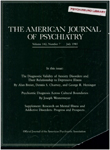"Organic brain syndromes": an empirical study and critical review
Abstract
The authors found that all but 3 of 80 randomly chosen patients in a Veterans Administration hospital who had been given a primary nonspecific neuropsychiatric diagnosis (organic brain syndrome, organic psychosis, chronic brain syndrome, etc.) could be assigned to specific diagnostic categories. Diagnosis was based on chart review and thorough neurological and clinical evaluation. Senile and alcoholic dementia and Korsakoff's syndrome were seen most often, and 15% of the patients were diagnosed as having functional disorders of the mental state. The authors review the organic brain syndrome diagnosis in light of this and other evidence. They believe that fractionation into more specific diagnoses is essential to further understanding of this group of diseases. Use of the general term can result in inappropriate or no treatment; further, it hampers essential psychological, pharmacological, and biomedical research on these disorders.
Access content
To read the fulltext, please use one of the options below to sign in or purchase access.- Personal login
- Institutional Login
- Sign in via OpenAthens
- Register for access
-
Please login/register if you wish to pair your device and check access availability.
Not a subscriber?
PsychiatryOnline subscription options offer access to the DSM-5 library, books, journals, CME, and patient resources. This all-in-one virtual library provides psychiatrists and mental health professionals with key resources for diagnosis, treatment, research, and professional development.
Need more help? PsychiatryOnline Customer Service may be reached by emailing [email protected] or by calling 800-368-5777 (in the U.S.) or 703-907-7322 (outside the U.S.).



